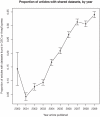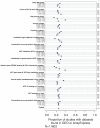Who shares? Who doesn't? Factors associated with openly archiving raw research data
- PMID: 21765886
- PMCID: PMC3135593
- DOI: 10.1371/journal.pone.0018657
Who shares? Who doesn't? Factors associated with openly archiving raw research data
Abstract
Many initiatives encourage investigators to share their raw datasets in hopes of increasing research efficiency and quality. Despite these investments of time and money, we do not have a firm grasp of who openly shares raw research data, who doesn't, and which initiatives are correlated with high rates of data sharing. In this analysis I use bibliometric methods to identify patterns in the frequency with which investigators openly archive their raw gene expression microarray datasets after study publication. Automated methods identified 11,603 articles published between 2000 and 2009 that describe the creation of gene expression microarray data. Associated datasets in best-practice repositories were found for 25% of these articles, increasing from less than 5% in 2001 to 30%-35% in 2007-2009. Accounting for sensitivity of the automated methods, approximately 45% of recent gene expression studies made their data publicly available. First-order factor analysis on 124 diverse bibliometric attributes of the data creation articles revealed 15 factors describing authorship, funding, institution, publication, and domain environments. In multivariate regression, authors were most likely to share data if they had prior experience sharing or reusing data, if their study was published in an open access journal or a journal with a relatively strong data sharing policy, or if the study was funded by a large number of NIH grants. Authors of studies on cancer and human subjects were least likely to make their datasets available. These results suggest research data sharing levels are still low and increasing only slowly, and data is least available in areas where it could make the biggest impact. Let's learn from those with high rates of sharing to embrace the full potential of our research output.
Conflict of interest statement
Figures






References
-
- McCain K. Mandating Sharing: Journal Policies in the Natural Sciences. Science Communication. 1995;16:403–431.
-
- Piwowar H, Chapman W. A review of journal policies for sharing research data. ELPUB, Toronto Canada; 2008.
-
- National Institutes of Health (NIH) 2003. NOT-OD-03-032: Final NIH Statement on Sharing Research Data.
-
- National Institutes of Health (NIH) 2007. NOT-OD-08-013: Implementation Guidance and Instructions for Applicants: Policy for Sharing of Data Obtained in NIH-Supported or Conducted Genome-Wide Association Studies (GWAS)
-
- Nation Science Foundation (NSF) 2011. Grant Proposal Guide, Chapter II.C.2.j.
Publication types
MeSH terms
Grants and funding
LinkOut - more resources
Full Text Sources
Other Literature Sources

